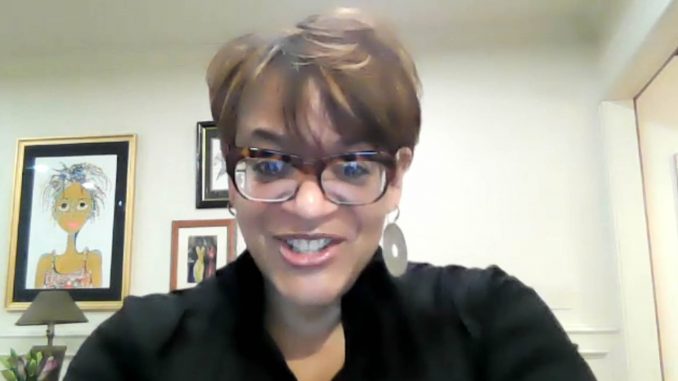

Raised 15 minutes away in Mt. Airy, Valerie Harrison remembers feeling captivated by North Central’s rich Black history.
During her childhood, she soaked in the legacy of legendary sites like the Church of the Advocate and the Universal Negro Improvement Association’s 121st division while visiting her cousins on 15th Street near Oxford and her aunt on Cumberland Street near 18th.
“North Philadelphia is where we spent every holiday growing up, it was a tight-knight community, a community of families, a place rich in history,” Harrison said. “We had a tremendous sense of community pride, especially for the community’s work to ensure Black children would have educational and economic opportunities.”
Still enamored with North Central, Harrison now serves as President Richard Englert’s advisor on equity, diversity and inclusion and led Temple University’s efforts to promote and educate the university community about racial justice, like overseeing Temple’s anti-racism initiative since its conception in June 2020 following growing nationwide calls for racial justice.
“I’ve learned so many lessons from her,” Englert said. “She’s a clear thinker without an agenda and is focused on, ‘Let’s get something done and do it the right way, and do the right thing.’”
In June 2020, hundreds of Temple students joined the nation in marching against racial injustice in response to the killing of George Floyd, a Black man who died in Minnesota after a police officer knelt on his neck for about eight minutes, The Temple News reported.
Englert first asked Harrison to develop plans for Temple’s anti-racism initiative during an executive cabinet meeting on June 25, 2020, Harrison said. The university announced the initiative on Sept. 16, 2020, which included a self-evaluation of Temple Police, the creation of a center for anti-racist research in Anderson Hall and greater funding for the Africology and African American studies department, The Temple News reported.
“We’re on a much faster track with much more work to do,” Harrison said. “2020 has shined a light on the injustice we already knew existed, and it’s accelerated and amplified our work to change the systems that bring us back to this same problem decade after decade.”
Of the initiative’s components, Harrison is most excited for Cecil B. Moore Scholars, an academic bridge program that provides scholarships and dual enrollment to Philadelphia School District seniors living in the eight ZIP codes surrounding Main Campus, The Temple News reported. The program began for the 2020-21 academic year, and Harrison recently helped select a director for the program, she said.
Harrison’s mother died when she was 11 years old, and she credits her father and the School District of Philadelphia with teaching her the lessons she needed to be successful in her career, she said.
“I’m the product of three good Philadelphia public schools,” Harrison said. “We’ve talked about reinstating an academic enrichment pipeline program for students in Philadelphia public schools for some time, so seeing this come to fruition has been one of my proudest moments at Temple.”
In addition to her work on the anti-racism initiative, Harrison serves on Temple’s Presidential Search Committee. She, along with Dean of Students Stephanie Ives, also led the university’s review of the Student Conduct Code during the Fall 2020 semester and teaches classes in the Beasley School of Law, where she is excited to teach a new Race and the Law course in the fall, she said.
Harrison first came to Temple in 1998 as an associate university counsel and received her master’s degree in liberal arts and doctoral degree in African American studies from the university in 2007 and 2015, respectively. She felt drawn to Temple after hearing Molefi Asante, chair of the Africology and African American studies department, speak at a church in Germantown while she was in college about the need for Black people to understand the history of their greatness, she said.
“She’s perhaps one of the most articulate and determined graduate students I’ve met,” Asante said. “She had a keen insight into the nature of the community and the academy and a political astuteness that probably comes with living with struggles for justice. She was a visionary, a humanist.”
Harrison briefly left Temple in 2012 to work at Arcadia University and Lincoln University, but returned in 2016 as former President Neil Theobald’s senior advisor on equity, diversity and inclusion.
Throughout her career, Harrison has been guided by lessons her father taught her, the most important being that she has unlimited possibilities in life if she puts in the hard work to achieve her goals, she said. She hopes to provide the same support she received from her family, schools and community to students at Temple and in North Philadelphia, she added.
“I just want to ensure that every young person in Philadelphia has the same opportunity that I did,” Harrison said.



Be the first to comment